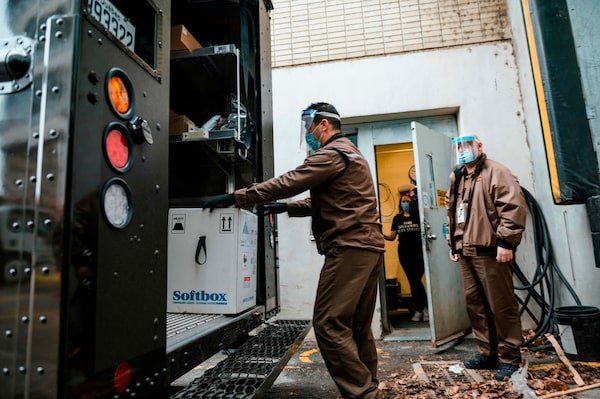
A UPS employee picks up the box containing some of the first Covid-19 vaccines into the Donald Berman Maimonides Geriatric Centre in Montreal on Dec. 14, 2020.ANDREJ IVANOV/AFP/Getty Images
The federal government has awarded a $16-million contract to accounting firm Deloitte to “manage vaccine rollout, administration and reporting,” even as hundreds of thousands of doses of the COVID-19 vaccine have already been administered.
In December, Ottawa sent out a request for proposals from a shortlist of suppliers, asking for a system that could track doses en route from their manufacturer, manage their storage conditions, and monitor possible, albeit rare, adverse reactions.
As The Globe and Mail reported at the time, the request for proposals laid out an expansive system that was “mission critical” to the vaccination campaign.
In an interview with CBC’s Rosemary Barton on Sunday, Procurement Minister Anita Anand acknowledged the contract had been awarded.
When will Canadians get COVID-19 vaccines? The federal and provincial rollout plans so far
But said the government has said its existing information technology systems are up to the job. “The Public Health Agency of Canada does have an IT [information technology] system in place that is being used in conjunction with the provinces and territories at the current time,” Ms. Anand said.
While she did not say what gaps currently exist, she added the system is necessary to “ensure that we have the most seamless IT system possible as we go through this complex period in our country’s history.”
The government did not provide a date as to when the new system would be online. Ottawa, in the original request for proposals, hoped that a “minimum viable product” would need to be online “during January, 2021, or a modified date to be mutually agreed.”
Iris Gorfinkel, a family doctor in Toronto, wrote an article in August calling attention to Canada’s lack of vaccine-tracking technology. Canada, she wrote, needs a system that can follow vaccines like Walmart tracks inventory. “Using bar codes has been shown to save time, improve user experience, simplify documentation, reduce transcription errors and would create robust and comprehensive [vaccine registries],” Dr. Gorfinkel wrote.
More than five months on, Dr. Gorfinkel said hiring Deloitte to build this new system shows “the federal government is moving in the right direction.” But, she added, “this should have been done months ago.”
Every province is pursuing a different approach to the technical aspect of the vaccination campaign. Ontario has spent months developing COVaxON, a system based on existing technology that has allowed health authorities to track vaccinations and that plugs into the province’s immunization database.
But only hospitals are using the platform. As the provinces vaccinate people in long-term care homes and in Indigenous communities, they are relying on pen and paper to keep track of the inoculations. The data is entered into the provincial system regularly, a source in the Ontario government said. The province aims to extend COVaxON to all doctors and pharmacies as the distribution ramps up.
Bob Best, an emergency room doctor in British Columbia, received his first dose at a Burnaby hospital this month. “Each desk was staffed by a nurse who had vaccine supplies and a binder,” he told The Globe. He said nurses tracked each patient’s vaccination in those binders. Hospital staff will need to manually enter that data, where it will eventually be available on B.C’s digitized health records system.
As the vaccination campaign kicks into high gear, a lack of digitization could create bottlenecks in the system.
A huge benefit to a centralized and digitized vaccine-tracking system is that it can easily note adverse reactions and bad batches of doses. Right now, however, provinces and territories are responsible for monitoring the administration of those vaccines, while doctors are obligated to report problems to Health Canada.
That leaves the information siloed, Dr. Gorfinkel says. “This is a serious gap.”
As the vaccine distribution continues, there are bound to be stories of negative side effects, or individuals contracting COVID-19 despite being inoculated. It will be crucial, Dr. Gorfinkel said, to know the context behind those issues. “Could it be something in the manufacturing? Could it be that particular lot? Could it be that particular clinic? Could it be a specific population?”
Dr. Gorfinkel said she worries that a disconnected approach will make it difficult to notify individuals who may have received bad doses, and frustrate Canada’s efforts to contribute data to other countries through the World Health Organization.
Editor’s note: (Jan. 11, 2021): An earlier version of this article incorrectly included some of a journalist's question in Minister Anand's answer. In fact, she said "the goal of this additional procurement was to enhance the capabilities across the country to ensure that we have the most seamless I.T. system possible as we go through this complex period in our country's history."
Sign up for the Coronavirus Update newsletter to read the day’s essential coronavirus news, features and explainers written by Globe reporters.